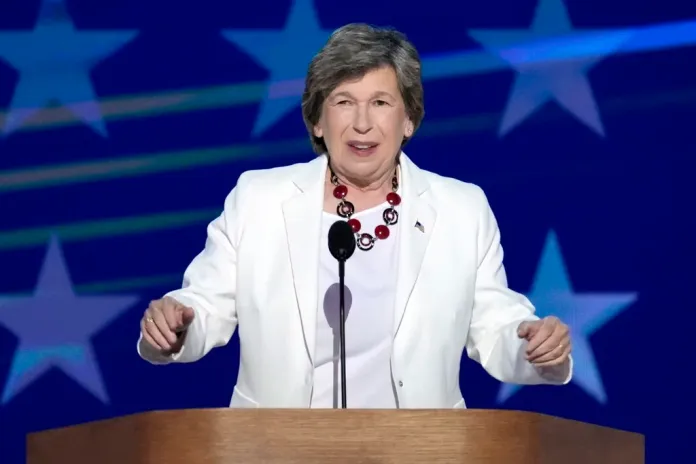A high-profile business watchdog has a pattern of accepting money from unions and, shortly after the fact, publishing informational materials or engaging in advocacy that aligns with the interests of the labor organizations paying it, a Washington Examiner review of public records has found.
The Private Equity Stakeholder Project, also known as Financial Services Stakeholder Action, is a nonprofit organization that frequently releases reports and interfaces with public officials in the hopes of reining in what it believes to be abuses perpetrated by private equity firms as well as advancing the interests of organized labor. Financial disclosures filed with the Department of Labor show that the organization received funds from the American Federation of Teachers, Writers Guild West, United Auto Workers, and the Service Employees International Union, among others, and began working to help those labor organizations achieve their goals after the fact.
“It’s clear that PESP is driven not by legitimate policy concerns, but by who is willing to pay them,” Pinpoint Policy Institute executive director Eric Ventimiglia told the Washington Examiner. “The facts show that this group is simply an extension of organized labor, and all of its reports and white papers must be viewed in that context.”
The Pinpoint Policy Institute advocates for deregulation and other right-of-center economic policies.
In the case of AFT, for example, PESP accepted $132,000 from the union between October 2023 and June 2024. In Fall 2024, as it was actively receiving payments from AFT, PESP’s healthcare campaign director wrote a report for the union admonishing private equity firms for allegedly worsening the quality of care in hospitals and encouraging healthcare workers to join unions — arguing that unionization improves patient outcomes and worker conditions.
Despite its name, AFT, whose president is Randi Weingarten, represents over 250,000 nurses and other healthcare professionals in addition to teachers. More unionized nurses means more dues paid into AFT’s treasury, meaning that PESP’s call to organize plays directly into the union’s interests.
Following its report, PESP reached out to the Washington State Investment Board to promote a separate report published by AFT, asking the board to use its leverage over private investment firms to pressure companies into adopting union-backed labor standards, according to email correspondence obtained by the Washington Examiner. PESP also promoted the AFT report on its website. In neither its email to the Washington state official nor its public post did PESP disclose that it had been paid by AFT.

“At the end of the day, every worker deserves support,” a PESP spokesman told the Washington Examiner. “The working class needs advocates — especially now, when billion-dollar private equity firms are systematically undermining jobs and livelihoods.”
The spokesman went on to argue that private equity-owned businesses have “subjected workers to layoffs, wage and hour violations, dangerous working conditions, and even child labor scandals” and that they “disproportionately drive corporate bankruptcies.”
“While Wall Street bigwigs are gutting jobs, stripping benefits, and leaving communities in crisis, someone has to stand up for the working class,” the spokesman concluded. “Supporting workers isn’t a liability — it’s a necessity.”
While the PESP spokesperson spoke at length about the necessity of his organization’s work, he did not address the apparent conflict of interest arising from it advocating for certain unions after receiving payments from them.
The United Food and Commercial Workers International Union is another union that has cut large checks to PESP, seemingly to retain its advocacy services. In this case, the union’s Mid-Atlantic chapter began making payments to the watchdog totaling $35,000 beginning on November 1, 2019.
On November 10, 2019, PESP released a report supporting UFCW in its dispute against Albertson and Safeway’s private equity owners, alleging that they took out excessive dividends while refusing to honor pension obligations to union employees. PESP did not disclose the payments from UFCW in this report.
After publishing the report, PESP sent a copy to the California State Treasurer’s Office, which then promised to pass it along to the relevant officials, per an email obtained by the Washington Examiner.
In addition to taking funding from labor unions, PESP relies on left-of-center philanthropies like the Soros family’s Open Society Foundations, the Omidyar Network Fund, the Rockefeller Brothers Fund, and the Democratic-aligned dark money network linked to Arabella Advisors to keep its lights on. A conservative watchdog group filed a complaint with the Internal Revenue Service in July alleging that PESP had abused its nonprofit status by performing “program service” operations for labor unions, which the complaint characterized as business activities outside the scope of what nonprofit organizations should offer.
PESP’s relationship with the Writers Guild is similar to the one it shares with AFT and UFCW.
Between 2019 and 2020, the guild paid PESP roughly $64,000, according to DOL records. In the midst of these payments, the watchdog published an April 2019 write-up supporting the Writers Guild’s effort to make talent agencies “end conflicts of interest” by imposing codes of conduct. PESP took it a step further by contacting the California State Teachers’ Retirement System on behalf of the Writers Guild to share the union’s concerns, according to an email obtained by the Washington Examiner. The email alludes to a “call last week,” indicating that PESP had been actively advocating for the union’s interests for some time.
THIS UNION CUT A CHECK TO A BUSINESS WATCHDOG. WEEKS LATER, THEY WERE DOING ITS BIDDING
In some cases, public sources do not reveal what a given union’s donations paid for. The UAW, for example, paid PESP roughly $83,000 between 2020 and 2021 for a variety of consulting services, which some of the disclosures note were related to electric vehicles; however, these payments do not appear to be linked to any materials in the public record, indicating that they may have paid for behind-the-scenes work, like contacting government officials.
SEIU and PESP also have an arrangement, with the former paying the latter over $20,000 between 2018 and 2022, cooperating on a number of joint advocacy campaigns.
